Bracing for Brexit

The Brexit effect on UK’s appeal to international students
The United Kingdom is undoubtedly one of the biggest players in international higher education. With its institutions leading the way in fields ranging from academic research, to teaching quality, to international recognition and rankings, it has the ability to attract students from all over the world. With the approach of Brexit’s deadline, UK universities are worried about access to research funding, staff mobility, and international partnerships.
The Analytics and Consulting Team (ACT) at Studyportals took on the challenge to understand the impact of Brexit on the hopes and perceptions of prospective non-British students. The week before the original Brexit deadline, 29th March 2019, we collected and analysed more than 1,400 responses from students around the world: 466 from the European Economic Area (EEA), and 945 from the rest of the world. We present a deeper insight into what aspects of UK higher education influenced prospective students to considered the UK among their possible options, and similarly – what made the island less an attractive international study destination for them.
The appeal of British higher education
A pioneer in international higher education, the UK is highly attractive for the international reputation and quality of its education system. The intrinsic value of the English language and culture has emerged as an important pull factor for international students. A consistent portion of survey participants interested in pursuing a degree in the UK cited the international recognition of the degree as well as the university ranking of British universities as determinants of their choice.
Students from the European Economic Area (EEA) place less value on the importance of the research infrastructure and the opportunity to combine work and study. Students from outside the EEA, conversely, think highly of these aspects, and consistently point quality as the most attractive aspect of UK higher education.
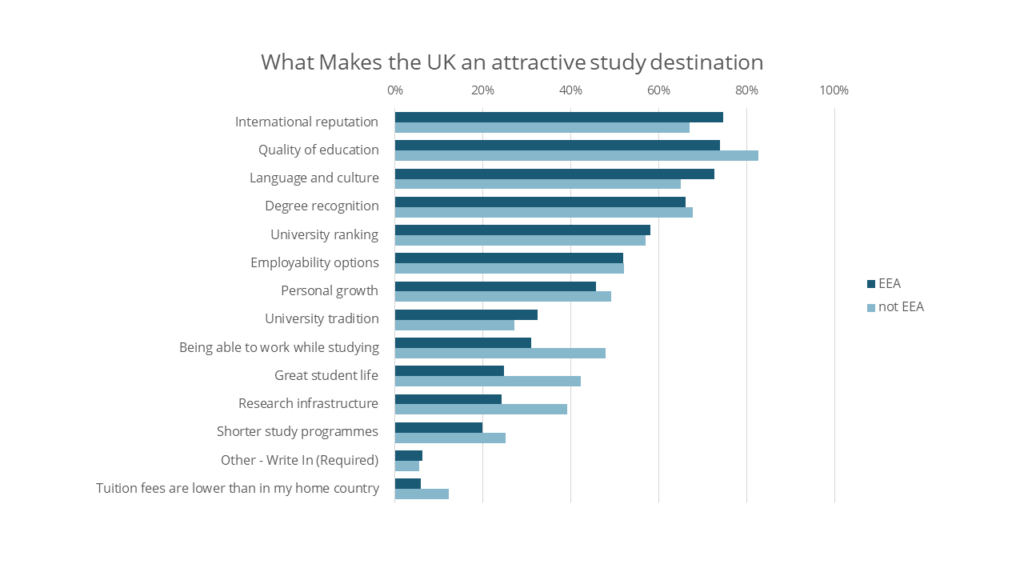
The UK is not for everyone
British higher education does come at a price, one that some respondents found too high. Among the reasons why respondents did not mention the UK as a potential study destination was the high cost of living. Living costs were quoted by 62% of non-EEA and 59% of EEA respondents and high tuition fees by 60% of non-EEA, and 65% of EEA to be the top factors preventing students from pursuing a British degree.
Other main concerns differ by the origin of the respondents. For instance, survey answers from EEA respondents highlight the availability of better study programmes in other countries, as well as a lack of cultural allure of the UK as main reasons to exclude the UK from their wishlist, marking a small, yet interesting, group of prospective students who prioritise the social element of studying abroad. This finding also points to the unflattering perceptions about the country’s openness toward internationals, especially since “unwelcoming culture” was mentioned twice as often by EEA prospective students.[
Outside of Europe, prospective students have more practical concerns: Non-EEA participants mentioned the difficulties in obtaining a visa or a post-study work permit among the main reasons not to shortlist the UK.
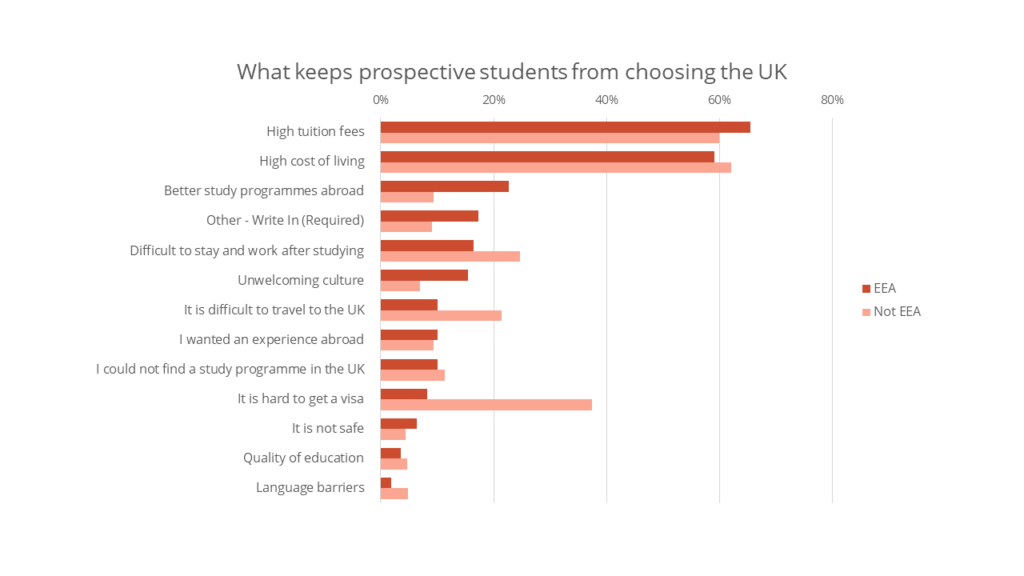
The Brexit effect
The impact of Brexit on students’ perceptions on a global scale is difficult to estimate. Students’ opinions about studying in the country differ by region, and the perception gap between students from EEA and non-EEA countries widens. Respondents from EEA countries have clearly a more pessimistic view on the subject. For them, the UK is drifting toward a less welcoming and less accessible country, where it’s difficult to finance an increasingly expensive study and find employment after graduation.
A great share of prospective students also believe that Brexit will negatively impact the quality of education and lessen the value of their degrees in the future, while a small group of respondents believes the value of a British degree will increase after the country’s withdrawal from the European Union.
So, has Brexit alone changed the appeal of UK’s higher education? We examined the decision flow of international students who already considered the UK as a main option to see how the position of the country progressed over the comparison stage.
While EEA students are generally more negative about Brexit, it does not critically influence their choice of destination as much as their counterparts. Answers to the survey show that EEA respondents whose first choice was the UK and hold a negative view on future developments, still consider the UK among the three most popular destination country for them. It would be reasonable to assume that the UK’s appeal as an international study destination is not linked to political changes or quality of life, but rests solidly on the strengths of its educational system.
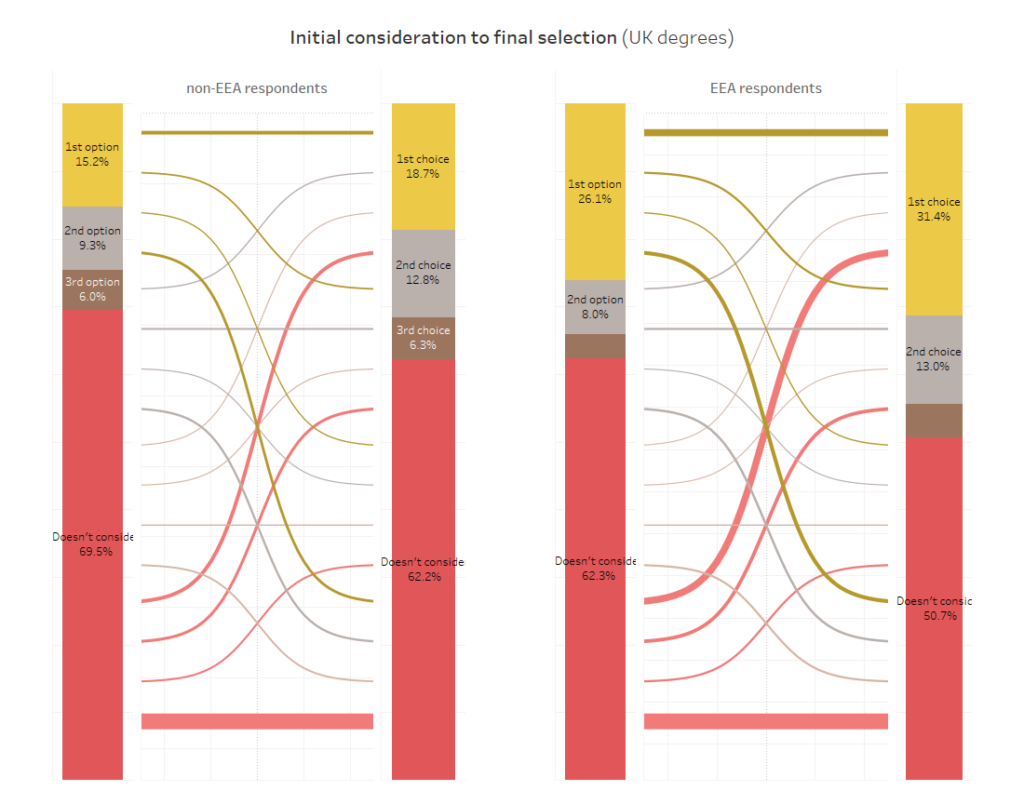
What universities can do to counter negative perceptions
While the outcome of our survey didn’t paint a hopeful picture, it’s important to remember that perceptions are fluid and a lot can be done to restore students’ belief in the system. As with any political shake-up, the uncertainty surrounding Brexit calls for proactive measures on behalf of both the UK government as well as UK universities to promote the country as an international study destination and alter its image of “unwelcoming” toward a friendly place for international students.
Manage expectations
One way to manage the impact of Brexit on the perception of EEA students is to elevate the international image of the UK. Let’s take for example their perceived cultural misfit and assertion that “things can worsen” after the UK exits the EU. To address their concerns, EEA students could be reassured that they are welcome and valued by British universities, as a targeted message can sway students toward a more positive opinion of life in the UK.
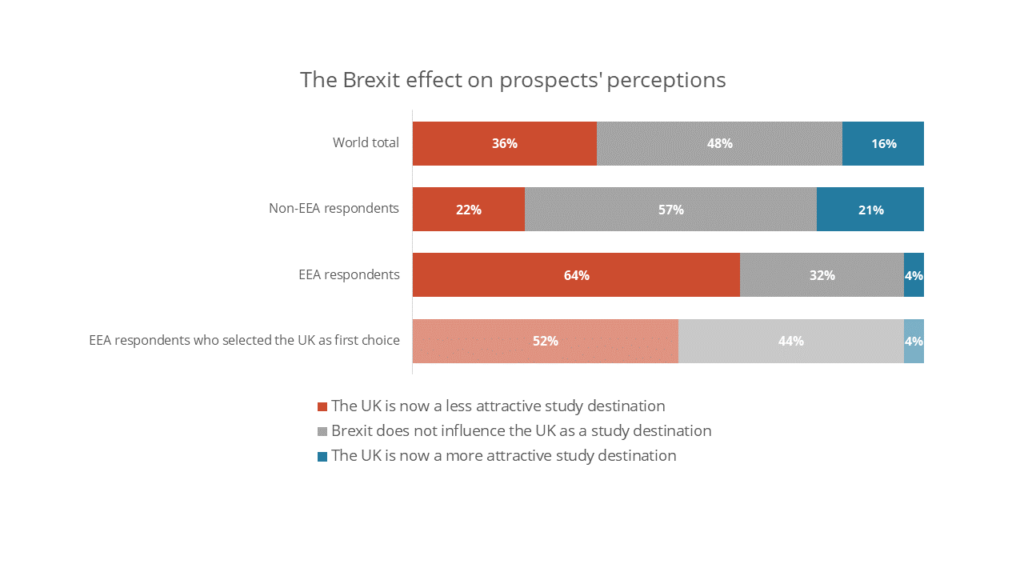
Expand carefully
British universities have sought after opening branch campuses in EU countries or elsewhere to lower the threshold of access to UK higher education, while still maintaining their quality offer. But consider expansion abroad carefully: Transnational education is widespread, but not always successful as found by a Studyportals’ internal research. Having worked with many universities on international market opportunities, we see that domestic market’s demand doesn’t always justify the expensive venture of branching out.
EEA students are not highly influenced by the availability of British education in their home country (see Figure 5), while non-EEA students show much greater interested in the value proposition. [CN1] These students that might consider studying in an international UK campus somewhere in Europe. We asked whether the choice was motivated by student’s concerns about their residence in the UK. We found that, among non-EEA respondents, the ease of access to the country was by far the largest perceived obstacle discouraging potential students from applying for UK universities.
A sound advice for international recruitment campaigns of students outside of Europe should focus more on taking care of the bureaucratic part of the application, lowering barriers, and providing guidance.
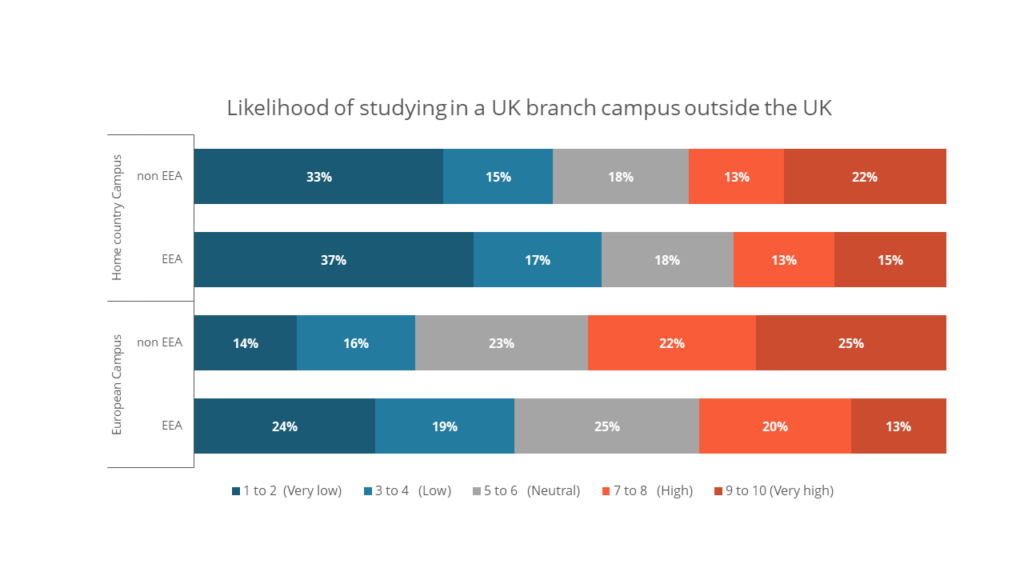
Plan, customise, target
The United Kingdom is still the most prominent study destination both for students from the EEA and outside of it. While it is important to focus on international recruitment, efforts spent on attracting students are more effective if they address and solve prospective students’ concerns.
International students have different pain points that can be addressed by marketing study programmes though tailored messaging and offering specific on-campus support. UK universities could leverage the uniqueness of its higher education to continue attracting EEA prospective students. The British system is undisputedly a global leader in research, which easily translates into unrivaled opportunities for candidates who aspire to a career in Academia.
Each British university could also capitalise on the country’s outstanding students satisfaction: a reputation echoed by many studies. By understanding how international students value certain aspects or overlook others, UK higher education institutions make sure that their offer is in line with expectations, its promotion strategy is aligned with prospects’ priorities, and its reputation stands out globally.
In conclusion
Should UK universities be seriously worried about the impact of Brexit on their international roadmap? The answer is: it depends on your key markets.
For students outside Europe, the effect is limited: their main concerns are linked to visa regulations and costs of living, not directly influenced by the political climate. EEA respondents on the other hand are deeply concerned about the UK situation after Brexit: the general mood is pessimistic and the reputation of the UK as a welcoming country is at stake.
As uncertainties loom ahead over strategic decision-making, a better understanding of perceptions should be the cornerstone for effective marketing campaigns and recruitment efforts to EEA countries.
While Brexit is indeed a challenge in the short-term, its disruption also opens doors for new and exciting opportunities, and the universities focusing on strengthening their strategies now will be the ones with most to gain in the long-term.
For more updates, follow us!





